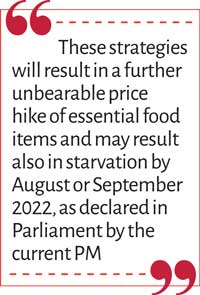Wednesday Feb 18, 2026
Wednesday Feb 18, 2026
Friday, 27 May 2022 00:30 - - {{hitsCtrl.values.hits}}
 Summarising the article, the Central Bank has indicated that 25% of the country’s imports ($ 1.6 to 1.8 billion) per month was carried out by using open accounts and over 12% through documents against payments (DP) Terms and documents against acceptance (DA) Terms. The Finance Ministry issued a Gazette notification with necessary guidelines recently banning the imports using open account payment terms with effect from 20 May 2022.
Summarising the article, the Central Bank has indicated that 25% of the country’s imports ($ 1.6 to 1.8 billion) per month was carried out by using open accounts and over 12% through documents against payments (DP) Terms and documents against acceptance (DA) Terms. The Finance Ministry issued a Gazette notification with necessary guidelines recently banning the imports using open account payment terms with effect from 20 May 2022.
An open account transaction is a sale where the goods are shipped and delivered before payment is due, providing an advantage to the importer (and thereby the importer’s country) in terms of cash flow. This extension of credit by the seller to the buyer which is more commonly used abroad, the goods together with all necessary documents, are shipped directly to the importer who has agreed to pay the exporters invoice at a specified date under this method. This is based on trust between the exporter and importer.
Sri Lanka imports around $ 200 million of food a month, including onions, sprats, potatoes, lentils, cereals, and rice to meet the needs of the consumers. The clamp down on the dollar buying from markets on open account by food importers and forcing Pettah traders to open Letters of Credit (LCs) or getting customs authorities to crack down on food importers who do not fully settle bills on official channels will result in creating an unprecedented food shortage within the next two months according to many importers.
The Central Bank has adopted many methods to try and prevent black market transactions through “Hawala” and “Undiyal”. These are systems which are supposed to be absolutely reliable and operated for over 500 years and proceeds delivered at the doorstep. With all the efforts to arrest people carrying out such transactions and even taking them into custody, the remittances from overseas expatriates have not increased and in fact decreased compared to last year.
As we all know, human beings are ingenious in going around systems when the need arises. When parents send children overseas for education they send monthly remittances, for their course fees and living expenses. The students are used to receiving such remittances. If parents are not provided foreign exchange for this purpose, they will naturally try other means. It is simply a matter of setting up a procedure where the expatriates without sending the money to Sri Lanka will send the money directly to the respective universities, thereby ensuring that these students do not have to be on the streets.
An example was given of consequences to students by a Central Bank Past Deputy Governor Dr. W.A. Wijewardena, who in one of his articles stated that when he was involved in doing research for his PhD in England, there was a similar crisis in Nigeria and the students were on the road literally begging for money. Our Sri Lanka parents would not allow this to happen to their children and they will adopt ingenious methods to meet their foreign exchange requirements.
The Central Bank with all its efforts to curtail the black market will not succeed, by using these strategies. We are aware that there is absolutely no foreign exchange to fulfil any of our obligations. I believe that a large amount of foreign exchange is sent yearly on students’ fees. At one stage, the Central bank indicated that their first priority was remittances to students but how can there be any priority if the foreign reserves are closer to zero.
It is reported that exports are over one billion per month to date during every month except in April 2022, but only about 50% of that is brought back to Sri Lanka. In fact, I believe that the garment industry is allowed to keep some of the foreign exchange in order to purchase their inputs or production which is apparently around 40% of the cost of the exports, but other exporters are obviously not remitting back their hard-earned export proceeds, anticipating that there will be continuous depreciation of the rupee. The CB has now put a corridor within which banks can transact business in dollars for the rupee to be within Rs. 355- to Rs. 365 per dollar. How long they can maintain these rates is any one’s guess, without having foreign exchange to defend the rupee. My guess is they will be forced to increase that rate and have some sort of “Pegged Float”.
I am told that in India, exporters are required to remit their full proceeds back to their country. Cannot we adopt a similar policy without trying to restrict imports of essential food which may result in starvation? These strategies will result in a further unbearable price hike of essential food items and may result also in starvation by August or September 2022, as declared in Parliament by the current PM. I do not know if he took such restrictions into consideration when he made those remarks. If at all, it may further exacerbate the sad situation.
Unless the Chambers make strong representations not to immediately bring in these restrictions and ensure that there are sufficient stocks of food items in the country before they impose such controls, it will result in a disaster. Unfortunately, due to the stupid and obstinate decision to ban pesticides and chemical fertilisers, the Maha Harvest was around 40% less than in the previous year. It is also observed that only 25% of the available land is being cultivated for Yala, basically without fertiliser, and the harvest will drop even below 25%, with no rice available through indigenous production. The stupid policy has now been changed, but it is too late. We are told that India is going to send us a large stock of urea. I hope it will be in time to fertilise the Yala Crop. If not, there will definitely be a shortage of rice and if we do not import using whatever channels available, the people of our country will not even have enough rice for one meal per day.
cultivated for Yala, basically without fertiliser, and the harvest will drop even below 25%, with no rice available through indigenous production. The stupid policy has now been changed, but it is too late. We are told that India is going to send us a large stock of urea. I hope it will be in time to fertilise the Yala Crop. If not, there will definitely be a shortage of rice and if we do not import using whatever channels available, the people of our country will not even have enough rice for one meal per day.
Our Chambers are normally in the practice of playing ball with ridiculous policies and criticising such policies after the event. These importers may not belong to those prestigious chambers, which comprise of a different class of members, but if they do not act with the countries’ interest at heart, they will definitely exacerbate again the impending food shortage.
(The writer is former Chairman Commercial Bank PLC, United Motors PLC, Deputy Chairman Hayley’s PLC, Former Chairman Employers Federation of Ceylon, Planter’s Association of Ceylon, Former Chairman ICC Sri Lanka., and Chairman of the Joint Chambers of Commerce and Industry, and Past International President, 2007/2008, Lions Clubs International.)